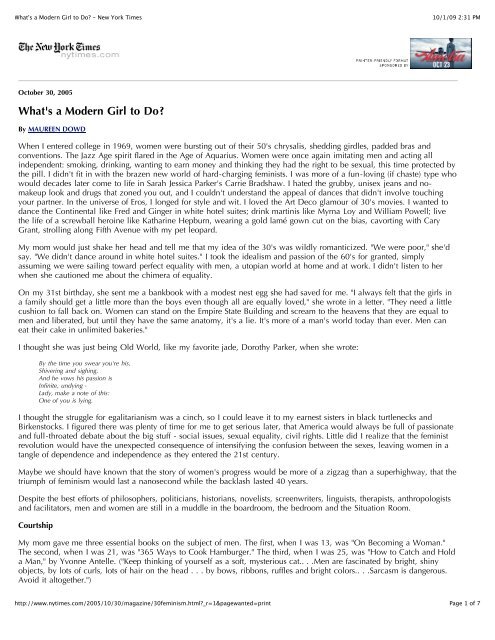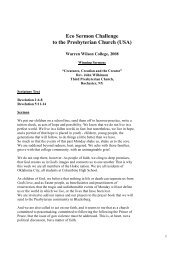What's a Modern Girl to Do? - Warren Wilson College
What's a Modern Girl to Do? - Warren Wilson College
What's a Modern Girl to Do? - Warren Wilson College
Create successful ePaper yourself
Turn your PDF publications into a flip-book with our unique Google optimized e-Paper software.
<strong>What's</strong> a <strong>Modern</strong> <strong>Girl</strong> <strong>to</strong> <strong>Do</strong>? - New York Times<br />
Oc<strong>to</strong>ber 30, 2005<br />
<strong>What's</strong> a <strong>Modern</strong> <strong>Girl</strong> <strong>to</strong> <strong>Do</strong>?<br />
By MAUREEN DOWD<br />
http://www.nytimes.com/2005/10/30/magazine/30feminism.html?_r=1&pagewanted=print<br />
10/1/09 2:31 PM<br />
When I entered college in 1969, women were bursting out of their 50's chrysalis, shedding girdles, padded bras and<br />
conventions. The Jazz Age spirit flared in the Age of Aquarius. Women were once again imitating men and acting all<br />
independent: smoking, drinking, wanting <strong>to</strong> earn money and thinking they had the right <strong>to</strong> be sexual, this time protected by<br />
the pill. I didn't fit in with the brazen new world of hard-charging feminists. I was more of a fun-loving (if chaste) type who<br />
would decades later come <strong>to</strong> life in Sarah Jessica Parker's Carrie Bradshaw. I hated the grubby, unisex jeans and nomakeup<br />
look and drugs that zoned you out, and I couldn't understand the appeal of dances that didn't involve <strong>to</strong>uching<br />
your partner. In the universe of Eros, I longed for style and wit. I loved the Art Deco glamour of 30's movies. I wanted <strong>to</strong><br />
dance the Continental like Fred and Ginger in white hotel suites; drink martinis like Myrna Loy and William Powell; live<br />
the life of a screwball heroine like Katharine Hepburn, wearing a gold lamé gown cut on the bias, cavorting with Cary<br />
Grant, strolling along Fifth Avenue with my pet leopard.<br />
My mom would just shake her head and tell me that my idea of the 30's was wildly romanticized. "We were poor," she'd<br />
say. "We didn't dance around in white hotel suites." I <strong>to</strong>ok the idealism and passion of the 60's for granted, simply<br />
assuming we were sailing <strong>to</strong>ward perfect equality with men, a u<strong>to</strong>pian world at home and at work. I didn't listen <strong>to</strong> her<br />
when she cautioned me about the chimera of equality.<br />
On my 31st birthday, she sent me a bankbook with a modest nest egg she had saved for me. "I always felt that the girls in<br />
a family should get a little more than the boys even though all are equally loved," she wrote in a letter. "They need a little<br />
cushion <strong>to</strong> fall back on. Women can stand on the Empire State Building and scream <strong>to</strong> the heavens that they are equal <strong>to</strong><br />
men and liberated, but until they have the same ana<strong>to</strong>my, it's a lie. It's more of a man's world <strong>to</strong>day than ever. Men can<br />
eat their cake in unlimited bakeries."<br />
I thought she was just being Old World, like my favorite jade, <strong>Do</strong>rothy Parker, when she wrote:<br />
By the time you swear you're his,<br />
Shivering and sighing,<br />
And he vows his passion is<br />
Infinite, undying -<br />
Lady, make a note of this:<br />
One of you is lying.<br />
I thought the struggle for egalitarianism was a cinch, so I could leave it <strong>to</strong> my earnest sisters in black turtlenecks and<br />
Birkens<strong>to</strong>cks. I figured there was plenty of time for me <strong>to</strong> get serious later, that America would always be full of passionate<br />
and full-throated debate about the big stuff - social issues, sexual equality, civil rights. Little did I realize that the feminist<br />
revolution would have the unexpected consequence of intensifying the confusion between the sexes, leaving women in a<br />
tangle of dependence and independence as they entered the 21st century.<br />
Maybe we should have known that the s<strong>to</strong>ry of women's progress would be more of a zigzag than a superhighway, that the<br />
triumph of feminism would last a nanosecond while the backlash lasted 40 years.<br />
Despite the best efforts of philosophers, politicians, his<strong>to</strong>rians, novelists, screenwriters, linguists, therapists, anthropologists<br />
and facilita<strong>to</strong>rs, men and women are still in a muddle in the boardroom, the bedroom and the Situation Room.<br />
Courtship<br />
My mom gave me three essential books on the subject of men. The first, when I was 13, was "On Becoming a Woman."<br />
The second, when I was 21, was "365 Ways <strong>to</strong> Cook Hamburger." The third, when I was 25, was "How <strong>to</strong> Catch and Hold<br />
a Man," by Yvonne Antelle. ("Keep thinking of yourself as a soft, mysterious cat.. . .Men are fascinated by bright, shiny<br />
objects, by lots of curls, lots of hair on the head . . . by bows, ribbons, ruffles and bright colors.. . .Sarcasm is dangerous.<br />
Avoid it al<strong>to</strong>gether.")<br />
Page 1 of 7
<strong>What's</strong> a <strong>Modern</strong> <strong>Girl</strong> <strong>to</strong> <strong>Do</strong>? - New York Times<br />
Because I received "How <strong>to</strong> Catch and Hold a Man" at a time when we were entering the Age of Equality, I put it aside as<br />
an anachronism. After all, sometime in the 1960's flirting went out of fashion, as did ironing boards, makeup and the idea<br />
that men needed <strong>to</strong> be "trapped" or "landed." The way <strong>to</strong> approach men, we reasoned, was forthrightly and without games,<br />
artifice or frills. Unfortunately, his<strong>to</strong>ry has shown this <strong>to</strong> be a misguided notion.<br />
http://www.nytimes.com/2005/10/30/magazine/30feminism.html?_r=1&pagewanted=print<br />
10/1/09 2:31 PM<br />
I knew it even before the 1995 publication of "The Rules," a dating bible that encouraged women <strong>to</strong> return <strong>to</strong> prefeminist<br />
mind games by playing hard <strong>to</strong> get. ("<strong>Do</strong>n't stay on the phone for more than 10 minutes.. . .Even if you are the head of<br />
your own company. . .when you're with a man you like, be quiet and mysterious, act ladylike, cross your legs and smile.. .<br />
.Wear black sheer pantyhose and hike up your skirt <strong>to</strong> entice the opposite sex!")<br />
I knew this before fashion magazines became crowded with crinolines, bows, ruffles, leopard-skin scarves, 50's party<br />
dresses and other sar<strong>to</strong>rial equivalents of flirting and with articles like "The Return of Hard <strong>to</strong> Get." ("I think it behooves us<br />
<strong>to</strong> s<strong>to</strong>p offering each other these pearls of feminism, <strong>to</strong> s<strong>to</strong>p saying, 'So, why don't you call him?"' a writer lectured in<br />
Mademoiselle. "Some men must have the thrill of the chase.")<br />
I knew things were changing because a succession of my single girlfriends had called, sounding sheepish, <strong>to</strong> ask if they<br />
could borrow my out-of-print copy of "How <strong>to</strong> Catch and Hold a Man."<br />
Decades after the feminist movement promised equality with men, it was becoming increasingly apparent that many<br />
women would have <strong>to</strong> brush up on the venerable tricks of the trade: an absurdly charming little laugh, a pert <strong>to</strong>ss of the<br />
head, an air of saucy triumph, dewy eyes and a full knowledge of music, drawing, elegant note writing and geography. It<br />
would once more be considered captivating <strong>to</strong> lie on a chaise longue, pass a lacy handkerchief across the eyelids and<br />
complain of a case of springtime giddiness.<br />
Today, women have gone back <strong>to</strong> hunting their quarry - in person and in cyberspace - with elaborate schemes designed <strong>to</strong><br />
allow the deluded creatures <strong>to</strong> think they are the hunters. "Men like hunting, and we shouldn't deprive them of their<br />
chance <strong>to</strong> do their hunting and mating rituals," my 26-year-old friend Julie Bosman, a New York Times reporter, says. "As<br />
my mom says, Men don't like <strong>to</strong> be chased." Or as the Marvelettes sang, "The hunter gets captured by the game."<br />
These days the key <strong>to</strong> staying cool in the courtship rituals is B. & I., girls say - Busy and Important. "As much as you're<br />
waiting for that little envelope <strong>to</strong> appear on your screen," says Carrie Foster, a 29-year-old publicist in Washing<strong>to</strong>n, "you<br />
happen <strong>to</strong> have a lot of stuff <strong>to</strong> do anyway." If a guy rejects you or turns out <strong>to</strong> be the essence of evil, you can ratchet up<br />
from B. & I. <strong>to</strong> C.B.B., Can't Be Bothered. In the T.M.I. - Too Much Information - digital age, there can be infinite<br />
technological foreplay.<br />
Helen Fisher, a Rutgers anthropologist, concurs with Julie: "What our grandmothers <strong>to</strong>ld us about playing hard <strong>to</strong> get is true.<br />
The whole point of the game is <strong>to</strong> impress and capture. It's not about honesty. Many men and women, when they're<br />
playing the courtship game, deceive so they can win. Novelty, excitement and danger drive up dopamine in the brain. And<br />
both sexes brag."<br />
Women might dye their hair, apply makeup and spend hours finding a hip-slimming dress, she said, while men may drive<br />
a nice car or wear a fancy suit that makes them seem richer than they are. In this retro world, a woman must play hard <strong>to</strong><br />
get but stay soft as a kitten. And avoid sarcasm. Al<strong>to</strong>gether.<br />
Money<br />
In those faraway, long-ago days of feminism, there was talk about equal pay for equal work. Now there's talk about "girl<br />
money."<br />
A friend of mine in her 30's says it is a term she hears bandied about the New York dating scene. She also notes a shift in<br />
the type of gifts given at wedding showers around <strong>to</strong>wn, a reversion <strong>to</strong> 50's-style offerings: soup ladles and those frilly little<br />
aprons from Anthropologie and vintage s<strong>to</strong>res are being unwrapped along with see-through nighties and push-up bras.<br />
"What I find most disturbing about the 1950's-ification and retrogression of women's lives is that it has seeped in<strong>to</strong> the<br />
corporate and social culture, where it can do real damage," she complains. "Otherwise intelligent men, who know women<br />
still earn less than men as a rule, say things like: 'I'll get the check. You only have girl money."'<br />
Throughout the long, dark ages of undisputed patriarchy, women connived <strong>to</strong> trade beauty and sex for affluence and status.<br />
In the first flush of feminism, women offered <strong>to</strong> pay half the check with "woman money" as a way <strong>to</strong> show that these crass<br />
calculations - that a woman's worth in society was determined by her looks, that she was an ornament up for sale <strong>to</strong> the<br />
Page 2 of 7
<strong>What's</strong> a <strong>Modern</strong> <strong>Girl</strong> <strong>to</strong> <strong>Do</strong>? - New York Times<br />
highest bidder - no longer applied.<br />
Now dating etiquette has reverted. Young women no longer care about using the check <strong>to</strong> assert their equality. They care<br />
about using it <strong>to</strong> assess their sexuality. Going Dutch is an archaic feminist relic. Young women talk about it with disbelief<br />
and disdain. "It's a scuzzy 70's thing, like platform shoes on men," one <strong>to</strong>ld me.<br />
"Feminists in the 70's went overboard," Anne Schroeder, a 26-year-old magazine edi<strong>to</strong>r in Washing<strong>to</strong>n, agrees. "Paying is<br />
like opening a car door. It's nice. I appreciate it. But he doesn't have <strong>to</strong>."<br />
Unless he wants another date.<br />
Women in their 20's think old-school feminists looked for equality in all the wrong places, that instead of fighting battles<br />
about whether women should pay for dinner or wear padded bras they should have focused only on big economic issues.<br />
http://www.nytimes.com/2005/10/30/magazine/30feminism.html?_r=1&pagewanted=print<br />
10/1/09 2:31 PM<br />
After Googling and Bikramming <strong>to</strong> get ready for a first dinner date, a modern girl will end the evening with the Offering, an<br />
insincere bid <strong>to</strong> help pay the check. "They make like they are heading in<strong>to</strong> their bag after a meal, but it is a dodge," Marc<br />
San<strong>to</strong>ra, a 30-year-old Metro reporter for The Times, says. "They know you will s<strong>to</strong>p them before a credit card can be<br />
drawn. If you don't, they hold it against you."<br />
One of my girlfriends, a TV producer in New York, <strong>to</strong>ld me much the same thing: "If you offer, and they accept, then it's<br />
over."<br />
Jurassic feminists shudder at the retro implication of a quid profiterole. But it doesn't matter if the woman is making as<br />
much money as the man, or more, she expects him <strong>to</strong> pay, both <strong>to</strong> prove her desirability and as a way of signaling<br />
romance - something that's more confusing in a dating culture rife with casual hookups and group activities. (Once beyond<br />
the initial testing phase and settled in a relationship, of course, she can pony up more.)<br />
"There are plenty of ways for me <strong>to</strong> find out if he's going <strong>to</strong> see me as an equal without disturbing the dating ritual," one<br />
young woman says. "Disturbing the dating ritual leads <strong>to</strong> chaos. Everybody knows that."<br />
When I asked a young man at my gym how he and his lawyer girlfriend were going <strong>to</strong> divide the costs on a California<br />
vacation, he looked askance. "She never offers," he replied. "And I like paying for her." It is, as one guy said, "one of the<br />
few remaining ways we can demonstrate our manhood."<br />
Power Dynamics<br />
At a party for the Broadway opening of "Sweet Smell of Success," a <strong>to</strong>p New York producer gave me a lecture on the price<br />
of female success that was anything but sweet. He confessed that he had wanted <strong>to</strong> ask me out on a date when he was<br />
between marriages but nixed the idea because my job as a Times columnist made me <strong>to</strong>o intimidating. Men, he explained,<br />
prefer women who seem malleable and awed. He predicted that I would never find a mate because if there's one thing<br />
men fear, it's a woman who uses her critical faculties. Will she be critical of absolutely everything, even his manhood?<br />
He had hit on a primal fear of single successful women: that the aroma of male power is an aphrodisiac for women, but<br />
the perfume of female power is a turnoff for men. It <strong>to</strong>ok women a few decades <strong>to</strong> realize that everything they were doing<br />
<strong>to</strong> advance themselves in the boardroom could be sabotaging their chances in the bedroom, that evolution was lagging<br />
behind equality.<br />
A few years ago at a White House correspondents' dinner, I met a very beautiful and successful actress. Within minutes,<br />
she blurted out: "I can't believe I'm 46 and not married. Men only want <strong>to</strong> marry their personal assistants or P.R. women."<br />
I'd been noticing a trend along these lines, as famous and powerful men <strong>to</strong>ok up with young women whose job it was was<br />
<strong>to</strong> care for them and nurture them in some way: their secretaries, assistants, nannies, caterers, flight attendants, researchers<br />
and fact-checkers.<br />
John Schwartz of The New York Times made the trend official in 2004 when he reported: "Men would rather marry their<br />
secretaries than their bosses, and evolution may be <strong>to</strong> blame." A study by psychology researchers at the University of<br />
Michigan, using college undergraduates, suggested that men going for long-term relationships would rather marry women<br />
in subordinate jobs than women who are supervisors. Men think that women with important jobs are more likely <strong>to</strong> cheat<br />
on them. There it is, right in the DNA: women get penalized by insecure men for being <strong>to</strong>o independent.<br />
"The hypothesis," Dr. Stephanie Brown, the lead author of the study, theorized, "is that there are evolutionary pressures on<br />
Page 3 of 7
<strong>What's</strong> a <strong>Modern</strong> <strong>Girl</strong> <strong>to</strong> <strong>Do</strong>? - New York Times<br />
10/1/09 2:31 PM<br />
males <strong>to</strong> take steps <strong>to</strong> minimize the risk of raising offspring that are not their own." Women, by contrast, did not show a<br />
marked difference between their attraction <strong>to</strong> men who might work above them and their attraction <strong>to</strong> men who might work<br />
below them.<br />
So was the feminist movement some sort of cruel hoax? <strong>Do</strong> women get less desirable as they get more successful?<br />
After I first wrote on this subject, a Times reader named Ray Lewis e-mailed me. While we had assumed that making<br />
ourselves more professionally accomplished would make us more fascinating, it turned out, as Lewis put it, that smart<br />
women were "draining at times."<br />
Or as Bill Maher more crudely but usefully summed it up <strong>to</strong> Craig Ferguson on the "Late Late Show" on CBS: "Women get<br />
in relationships because they want somebody <strong>to</strong> talk <strong>to</strong>. Men want women <strong>to</strong> shut up."<br />
Women moving up still strive <strong>to</strong> marry up. Men moving up still tend <strong>to</strong> marry down. The two sexes' going in opposite<br />
directions has led <strong>to</strong> an epidemic of professional women missing out on husbands and kids.<br />
Sylvia Ann Hewlett, an economist and the author of "Creating a Life: Professional Women and the Quest for Children," a<br />
book published in 2002, conducted a survey and found that 55 percent of 35-year-old career women were childless. And<br />
among corporate executives who earn $100,000 or more, she said, 49 percent of the women did not have children,<br />
compared with only 19 percent of the men.<br />
Hewlett quantified, yet again, that men have an unfair advantage. "Nowadays," she said, "the rule of thumb seems <strong>to</strong> be that<br />
the more successful the woman, the less likely it is she will find a husband or bear a child. For men, the reverse is true."<br />
A 2005 report by researchers at four British universities indicated that a high I.Q. hampers a woman's chance <strong>to</strong> marry,<br />
while it is a plus for men. The prospect for marriage increased by 35 percent for guys for each 16-point increase in I.Q.;<br />
for women, there is a 40 percent drop for each 16-point rise.<br />
On a "60 Minutes" report on the Hewlett book, Lesley Stahl talked <strong>to</strong> two young women who went <strong>to</strong> Harvard Business<br />
School. They agreed that while they were the perfect age <strong>to</strong> start families, they didn't find it easy <strong>to</strong> meet the right mates.<br />
Men, apparently, learn early <strong>to</strong> protect their eggshell egos from high-achieving women. The girls said they hid the fact that<br />
they went <strong>to</strong> Harvard from guys they met because it was the kiss of death. "The H-bomb," they dubbed it. "As soon as you<br />
say Harvard Business School . . . that's the end of the conversation," Ani Vartanian said. "As soon as the guys say, 'Oh, I go<br />
<strong>to</strong> Harvard Business School,' all the girls start falling in<strong>to</strong> them."<br />
Hewlett thinks that the 2005 American workplace is more macho than ever. "It's actually much more difficult now than 10<br />
years ago <strong>to</strong> have a career and raise a family," she <strong>to</strong>ld me. "The trend lines continue that highly educated women in many<br />
countries are increasingly dealing with this creeping nonchoice and end up on this path of delaying finding a mate and<br />
delaying childbearing. Whether you're looking at Italy, Russia or the U.S., all of that is true." Many women continue <strong>to</strong> fear<br />
that the more they accomplish, the more they may have <strong>to</strong> sacrifice. They worry that men still veer away from "challenging"<br />
women because of a male atavistic desire <strong>to</strong> be the superior force in a relationship.<br />
"With men and women, it's always all about control issues, isn't it?" says a guy I know, talking about his bitter divorce.<br />
Or, as Craig Bierko, a musical comedy star and ac<strong>to</strong>r who played one of Carrie's boyfriends on "Sex and the City," <strong>to</strong>ld me,<br />
"Deep down, beneath the bluster and machismo, men are simply afraid <strong>to</strong> say that what they're truly looking for in a<br />
woman is an intelligent, confident and dependable partner in life whom they can devote themselves <strong>to</strong> unconditionally<br />
until she's 40."<br />
Ms. Versus Mrs.<br />
"Ms." was supposed <strong>to</strong> neutralize the stature of women, so they weren't publicly defined by their marital status. When The<br />
Times finally agreed <strong>to</strong> switch <strong>to</strong> Ms. in its news pages in 1986, after much hec<strong>to</strong>ring by feminists, Gloria Steinem sent<br />
flowers <strong>to</strong> the executive edi<strong>to</strong>r, Abe Rosenthal. But nowadays most young brides want <strong>to</strong> take their husbands' names and<br />
brag on the moniker Mrs., a brand that proclaims you belong <strong>to</strong> him. T-shirts with "MRS." emblazoned in sequins or sparkly<br />
beads are popular wedding-shower gifts.<br />
A Harvard economics professor, Claudia Goldin, did a study last year that found that 44 percent of women in the Harvard<br />
class of 1980 who married within 10 years of graduation kept their birth names, while in the class of '90 it was down <strong>to</strong> 32<br />
percent. In 1990, 23 percent of college-educated women kept their own names after marriage, while a decade later the<br />
http://www.nytimes.com/2005/10/30/magazine/30feminism.html?_r=1&pagewanted=print<br />
Page 4 of 7
<strong>What's</strong> a <strong>Modern</strong> <strong>Girl</strong> <strong>to</strong> <strong>Do</strong>? - New York Times<br />
number had fallen <strong>to</strong> 17 percent.<br />
Time magazine reported that an informal poll in the spring of 2005 by the Knot, a wedding Web site, showed similar<br />
results: 81 percent of respondents <strong>to</strong>ok their spouse's last name, an increase from 71 percent in 2000. The number of<br />
women with hyphenated surnames fell from 21 percent <strong>to</strong> 8 percent.<br />
http://www.nytimes.com/2005/10/30/magazine/30feminism.html?_r=1&pagewanted=print<br />
10/1/09 2:31 PM<br />
"It's a return <strong>to</strong> romance, a desire <strong>to</strong> make marriage work," Goldin <strong>to</strong>ld one interviewer, adding that young women might<br />
feel that by keeping their own names they were aligning themselves with tedious old-fashioned feminists, and this might be<br />
a turnoff <strong>to</strong> them.<br />
The professor, who married in 1979 and kept her name, under<strong>to</strong>ok the study after her niece, a lawyer, changed hers. "She<br />
felt that her generation of women didn't have <strong>to</strong> do the same things mine did, because of what we had already achieved,"<br />
Goldin <strong>to</strong>ld Time.<br />
Many women now do not think of domestic life as a "comfortable concentration camp," as Betty Friedan wrote in "The<br />
Feminine Mystique," where they are losing their identities and turning in<strong>to</strong> "anonymous biological robots in a docile mass."<br />
Now they want <strong>to</strong> be Mrs. Anonymous Biological Robot in a <strong>Do</strong>cile Mass. They dream of being rescued - <strong>to</strong> flirt, <strong>to</strong> shop,<br />
<strong>to</strong> stay home and be taken care of. They shop for "Stepford Fashions" - matching shoes and ladylike bags and the 50's-style<br />
satin, lace and chiffon party dresses featured in InStyle layouts - and spend their days at the gym trying for Wisteria Lane<br />
waistlines.<br />
The Times recently ran a front-page article about young women attending Ivy League colleges, women who are being<br />
groomed <strong>to</strong> take their places in the professional and political elite, who are planning <strong>to</strong> reject careers in favor of playing<br />
traditional roles, staying home and raising children.<br />
"My mother always <strong>to</strong>ld me you can't be the best career woman and the best mother at the same time," the brainy,<br />
accomplished Cynthia Liu <strong>to</strong>ld Louise S<strong>to</strong>ry, explaining why she hoped <strong>to</strong> be a stay-at-home mom a few years after she<br />
goes <strong>to</strong> law school. "You always have <strong>to</strong> choose one over the other."<br />
Kate White, the edi<strong>to</strong>r of Cosmopolitan, <strong>to</strong>ld me that she sees a distinct shift in what her readers want these days. "Women<br />
now don't want <strong>to</strong> be in the grind," she said. "The baby boomers made the grind seem unappealing."<br />
Cynthia Russett, a professor of American his<strong>to</strong>ry at Yale, <strong>to</strong>ld S<strong>to</strong>ry that women <strong>to</strong>day are simply more "realistic," having<br />
seen the dashed u<strong>to</strong>pia of those who assumed it wouldn't be so hard <strong>to</strong> combine full-time work and child rearing.<br />
To the extent that young women are rejecting the old idea of copying men and reshaping the world around their desires,<br />
it's exhilarating progress. But <strong>to</strong> the extent that a pampered class of females is walking away from the problem and just<br />
planning <strong>to</strong> marry rich enough <strong>to</strong> cosset themselves in a narrow world of dependence on men, it's an irritating setback. If<br />
the new ethos is "a woman needs a career like a fish needs a bicycle," it won't be healthy.<br />
Movies<br />
In all those Tracy-Hepburn movies more than a half-century ago, it was the snap and crackle of a romance between equals<br />
that was so exciting. You still see it onscreen occasionally - the incendiary chemistry of Brad Pitt and Angelina Jolie playing<br />
married assassins aiming for mutually assured orgasms and destruction in "Mr. and Mrs. Smith." Interestingly, that movie<br />
was described as retro because of its salty battle of wits between two peppery lovers. Moviemakers these days are more<br />
interested in exploring what Steve Martin, in his novel "Shopgirl," calls the "calm cushion" of romances between unequals.<br />
In James Brooks's movie "Spanglish," Adam Sandler, playing a sensitive Los Angeles chef, falls for his hot Mexican maid,<br />
just as in "Maid in Manhattan," Ralph Fiennes, playing a sensitive New York pol, falls for the hot Latino maid at his hotel,<br />
played by Jennifer Lopez. Sandler's maid, who cleans up for him without being able <strong>to</strong> speak English, is presented as the<br />
ideal woman, in looks and character. His wife, played by Téa Leoni, is repellent: a jangly, yakking, overachieving,<br />
overexercised, unfaithful, shallow she-monster who has just lost her job with a commercial design firm and fears she has<br />
lost her identity.<br />
In 2003, we had "<strong>Girl</strong> With a Pearl Earring," in which Colin Firth's Vermeer erotically paints Scarlett Johansson's Dutch<br />
maid, and Richard Curtis's "Love Actually," about the attraction of unequals. The witty and sophisticated British prime<br />
minister, played by Hugh Grant, falls for the chubby girl who wheels the tea and scones in<strong>to</strong> his office. A businessman<br />
married <strong>to</strong> the substantial Emma Thompson, the sister of the prime minister, falls for his sultry secretary. A novelist played<br />
by Colin Firth falls for his maid, who speaks only Portuguese.<br />
Page 5 of 7
<strong>What's</strong> a <strong>Modern</strong> <strong>Girl</strong> <strong>to</strong> <strong>Do</strong>? - New York Times<br />
10/1/09 2:31 PM<br />
Art is imitating life, turning women who seek equality in<strong>to</strong> selfish narcissists and objects of rejection rather than of affection.<br />
It's funny. I come from a family of Irish domestics - statuesque, 6-foot-tall women who cooked, kept house and acted as<br />
nannies for some of America's first families. I was always so proud of achieving more - succeeding in a high-powered<br />
career that would have been closed <strong>to</strong> my great-aunts. How odd, then, <strong>to</strong> find out now that being a maid would have<br />
enhanced my chances with men.<br />
An upstairs maid, of course.<br />
Women's Magazines<br />
Cosmo is still the best-selling magazine on college campuses, as it was when I was in college, and the best-selling<br />
monthly magazine on the newsstand. The June 2005 issue, with Jessica Simpson on the cover, her cleavage spilling out of<br />
an orange crocheted halter dress, could have been June 1970. The headlines are familiar: "How <strong>to</strong> turn him on in 10 words<br />
or less," "<strong>Do</strong> You Make Men M-E-L-T? Take our quiz," "Bridal Special," Cosmo's stud search and "Cosmo's Most Famous<br />
Sex Tips; the Legendary Tricks That Have Brought Countless Guys <strong>to</strong> Their Knees." (Sex Trick 4: "Place a glazed doughnut<br />
around your man's member, then gently nibble the pastry and lick the icing . . . as well as his manhood." Another favorite<br />
Cosmo trick is <strong>to</strong> yell out during sex which of your girlfriends thinks your man is hot.)<br />
At any newsstand, you'll see the original Cosmo girl's man-crazy, sex-obsessed image endlessly, tiresomely replicated, even<br />
for the teen set. On the cover of Elle <strong>Girl</strong>: "267 Ways <strong>to</strong> Look Hot."<br />
"There has been lots of copying - look at Glamour," Helen Gurley Brown, Cosmo's founding edi<strong>to</strong>r <strong>to</strong>ld me and sighed. "I<br />
used <strong>to</strong> have all the sex <strong>to</strong> myself."<br />
Before it curdled in<strong>to</strong> a collection of stereotypes, feminism had fleetingly held out a promise that there would be some<br />
precincts of womanly life that were not all about men. But it never quite materialized.<br />
It <strong>to</strong>ok only a few decades <strong>to</strong> create a brazen new world where the highest ideal is <strong>to</strong> acknowledge your inner slut. I am<br />
woman; see me strip. Instead of peaceful havens of girl things and boy things, we have a society where women of all ages<br />
are striving <strong>to</strong> become self-actualized sex kittens. Hollywood actresses now work out by taking pole-dancing classes.<br />
Female sexuality has been a confusing corkscrew path, not a serene progressive arc. We had decades of Vic<strong>to</strong>rian prudery,<br />
when women were not supposed <strong>to</strong> like sex. Then we had the pill and zipless encounters, when women were supposed <strong>to</strong><br />
have the same animalistic drive as men. Then it was discovered - shock, horror! - that men and women are not alike in<br />
their desires. But zipless morphed in<strong>to</strong> hookups, and the more one-night stands the girls on "Sex and the City" had, the<br />
grumpier they got.<br />
Oddly enough, Felix Dennis, who created the <strong>to</strong>p-selling Maxim, said he s<strong>to</strong>le his "us against the world" lad-magazine<br />
attitude from women's magazines like Cosmo. Just as women didn't mind losing Cosmo's prestigious fiction as the<br />
magazine got raunchier, plenty of guys were happy <strong>to</strong> lose the literary pretensions of venerable men's magazines and<br />
embrace simple-minded gender stereotypes, like the Maxim manifes<strong>to</strong> instructing women, "If we see you in the morning<br />
and night, why call us at work?"<br />
Jessica Simpson and Eva Longoria move seamlessly from showing their curves on the covers of Cosmo and Glamour <strong>to</strong><br />
Maxim, which dubbed Simpson "America's favorite ball and chain!" In the summer of 2005, both British GQ and FHM<br />
featured Pamela Anderson busting out of their covers. ("I think of my breasts as props," she <strong>to</strong>ld FHM.)<br />
A lot of women now want <strong>to</strong> be Maxim babes as much as men want Maxim babes. So women have moved from fighting<br />
objectification <strong>to</strong> seeking it. "I have been surprised," Maxim's edi<strong>to</strong>r, Ed Needham, confessed <strong>to</strong> me, "<strong>to</strong> find that a lot of<br />
women would want <strong>to</strong> be somehow validated as a Maxim girl type, that they'd like <strong>to</strong> be thought of as hot and would like<br />
their boyfriends <strong>to</strong> take pictures of them or make comments about them that mirror the Maxim representation of a woman,<br />
the Pamela Anderson sort of brand. That, <strong>to</strong> me, is kind of extraordinary."<br />
The luscious babes on the cover of Maxim were supposed <strong>to</strong> be men's fantasy guilty pleasures, after all, not their real lifeaffirming<br />
girlfriends.<br />
Beauty<br />
While I never related <strong>to</strong> the unstyled look of the early feminists and I tangled with boyfriends who did not want me <strong>to</strong> wear<br />
makeup and heels, I always assumed that one positive result of the feminist movement would be a more flexible and<br />
http://www.nytimes.com/2005/10/30/magazine/30feminism.html?_r=1&pagewanted=print<br />
Page 6 of 7
<strong>What's</strong> a <strong>Modern</strong> <strong>Girl</strong> <strong>to</strong> <strong>Do</strong>? - New York Times<br />
capacious notion of female beauty, a release from the tyranny of the girdled, primped ideal of the 50's.<br />
I was wrong. Forty years after the dawn of feminism, the ideal of feminine beauty is more rigid and unnatural than ever.<br />
When Gloria Steinem wrote that "all women are Bunnies," she did not mean it as a compliment; it was a feminist call <strong>to</strong><br />
arms. Decades later, it's just an aesthetic fact, as more and more women embrace Bo<strong>to</strong>x and implants and stretch and<br />
protrude <strong>to</strong> extreme proportions <strong>to</strong> satisfy male desires. Now that technology is biology, all women can look like inflatable<br />
dolls. It's clear that American narcissism has trumped American feminism.<br />
http://www.nytimes.com/2005/10/30/magazine/30feminism.html?_r=1&pagewanted=print<br />
10/1/09 2:31 PM<br />
It was naïve and misguided for the early feminists <strong>to</strong> tendentiously demonize Barbie and Cosmo girl, <strong>to</strong> disdain such female<br />
proclivities as shopping, applying makeup and hunting for sexy shoes and cute boyfriends and <strong>to</strong> prognosticate a world<br />
where men and women dressed alike and worked alike in navy suits and were equal in every way.<br />
But it is equally naïve and misguided for young women now <strong>to</strong> fritter away all their time shopping for boudoirish clothes<br />
and text-messaging about guys while they disdainfully ignore gender politics and the seismic shifts on the Supreme Court<br />
that will affect women's rights for a generation.<br />
What I didn't like at the start of the feminist movement was that young women were dressing alike, looking alike and<br />
thinking alike. They were supposed <strong>to</strong> be liberated, but it just seemed like stifling conformity.<br />
What I don't like now is that the young women rejecting the feminist movement are dressing alike, looking alike and<br />
thinking alike. The plumage is more colorful, the shapes are more curvy, the look is more plastic, the message is<br />
diametrically opposite - before it was don't be a sex object; now it's be a sex object - but the conformity is just as stifling.<br />
And the Future . . .<br />
Having boomeranged once, will women do it again in a couple of decades? If we flash forward <strong>to</strong> 2030, will we see all<br />
those young women who thought trying <strong>to</strong> Have It All was a pointless slog, now middle-aged and stranded in suburbia,<br />
popping Ativan, struggling with rebellious teenagers, deserted by husbands for younger babes, unable <strong>to</strong> get back in<strong>to</strong> a<br />
work force they never tried <strong>to</strong> be part of?<br />
It's easy <strong>to</strong> picture a surreally familiar scene when women realize they bought in<strong>to</strong> a raw deal and old trap. With no power<br />
or money or independence, they'll be mere domestic robots, lasering their legs and waxing their floors - or vice versa - and<br />
desperately seeking a new Betty Friedan.<br />
Maureen <strong>Do</strong>wd is a columnist for The New York Times. This essay is adapted from "Are Men Necessary: When Sexes<br />
Collide," <strong>to</strong> be published next month by G.P. Putnam's Sons.<br />
Copyright 2005 The New York Times Company Home Privacy Policy Search Corrections XML Help Contact Us Work for Us Site Map Back <strong>to</strong> Top<br />
Page 7 of 7

















